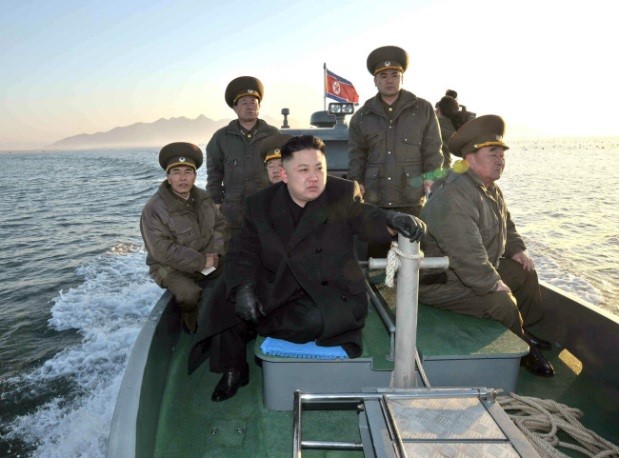 North Korea has been intermittently in the news in recent years creating confusion, generating new threats to strategic stability and even brandishing nuclear weapons against the sole global superpower—the United States.
North Korea has been intermittently in the news in recent years creating confusion, generating new threats to strategic stability and even brandishing nuclear weapons against the sole global superpower—the United States.
While South Korea has been known as an Asian model of economic growth since 1970s, North Korea was in the political and economic backwaters of world events until it walked out of NPT and then began to focus on developing nuclear weapons. Many major powers, particularly the US, Russia, China, and Japan along with South Korea held rounds and rounds of dialogue with North Korea to dissuade it from developing nuclear weapons and offered help to fight its energy crisis and developmental needs.
By deftly negotiating with these powers through a process known as the Six-Party talks, North Korea ultimately led everyone through the garden path and conducted a nuclear test in 2006. It went back on what it promised just in 2005 to remain non-nuclear and rubbed the major powers on the wrong side by testing a nuclear device.
Generally unknown in the realm of nuclear diplomacy, the major powers led by the United States still believed that North Korea could be encouraged to give up its nuclear ambitions and spend its energy on domestic developments.
But as the world witnessed, devastating famine, food crises and even the death of its leader, did not change North Korea’s nuclear path. The young leader Kim Jong Un sought to demonstrate his muscle power by conducting missile tests and the third nuclear explosion in February 2013.
He was furious but not deterred by UN Security Council Resolution 2094 and US-led sanctions and not allured by offers of developmental assistance. Instead, he sought to send messages about his regime’s strength to the North Korean people by indulging in WMD (Weapons of Mass Destruction) showcasing.
What is the motive behind the North Korean regime’s nuclear behaviour? First of all, North Korea has been internationally isolated for decades by refusing to adjust its form of governance and adopting economic reforms. Neither the collapse of Euro-Communism nor the Soviet disintegration nor the successful model of Chinese economic reforms persuaded North Korea to alter its course.
Secondly, China sought to use its influence over North Korea to use it as a pawn in its own political bargaining with the United States, and never seriously discouraged it from taking steps towards nuclear weapons development. The world is aware of Chinese leverage over North Korea. When North Korea torpedoed a South Korean naval vessel (the ROKS Cheonan on March 26, 2010) and killed more than forty sailors, the US and others looked up to Beijing to restrain Pyongyang. When North Korea shelled a disputed island (Yeonpyeong, in November 2010) and sparked a crisis with South Korea, once again Beijing was expected to do something. Throughout the Six-Party dialogue process, China was expected to exert its influence over the North Korean leadership.
Significantly, China always advised others to “stay calm” and refrain from imposing harsh sanctions against North Korea and sought to dilute UN sanctions. When North Korea finally showed its true colours, Beijing had already lost its leverage over its neighbouring ally. It appears that North Korea sought to develop its own strength to deter the US and other powers from intervening in its internal affairs rather than rely on China to back it up in the future. China’s close economic relations with the US perhaps convinced North Korea that it could not rely on China to protect it at the cost of its beneficial ties with the US.
North Korea is resource rich and it is now a de facto nuclear weapons power with delivery capabilities over long range. Expecting North Korea to abandon its nuclear capability will be like chasing shadows. The US, South Korea and many other countries, including Japan dangled economic bait to restrain North Korea’s nuclear ambition. But the authoritarian regime refused to blink.
Regime security is the priority of its new leadership and not economic and social development. It will be fruitless and futile to expect North Korea to respond to international sanctions and other pressures. Alternative methods of engaging North Korean regime must be devised.
The world must listen to North Korean version as well and avoid a discourse that would demonize North Korea. After all, the regime in Pyongyang is not North Korea. If one goes by the record of foreign intervention in Afghanistan, Iraq, Libya and the current state of affairs in Syria, North Korea should be spared.
If thousands of nuclear weapons could not protect the territorial integrity of the former Soviet Union, the nuclear arsenal of North Korea cannot provide its regime what is necessary for its survival. North Korea will sooner than later seek international cooperation for national survival and growth.
The international community must seize upon that opportunity. This is where India’s role may become crucial. India has not been part of the Six-Party dialogue process. The US and others have never sought New Delhi’s assistance to tackle the nuclear issue in the Korean peninsula.
Nor has India shown much interest to do so. North Korea’s WMD collaboration with Pakistan is not in India’s interest. India must devise damage-control initiatives to engage North Korea not with the goal of seeing a nuclear free North Korea, but to help assimilate that country in the international community to make it a normal country.
*The author, Chintamani Mahapatra is a Professor with the School of International Studies, JNU. He has written this piece exclusively for irgamag.com